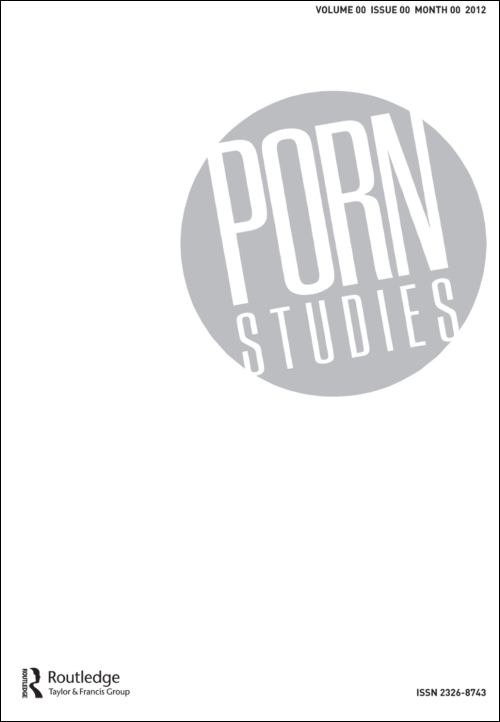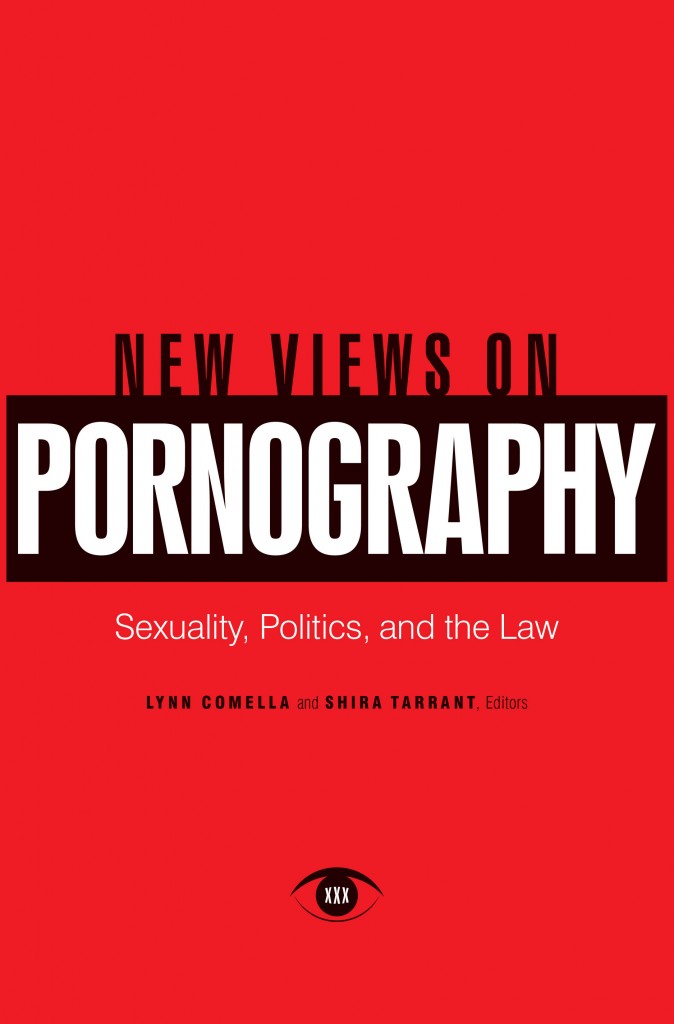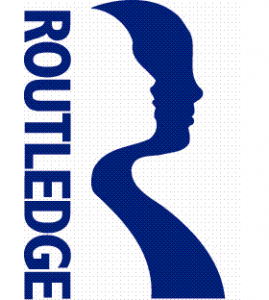
This special issue of Porn Studies will promote a discussion about race in the study of pornography. Race remains an underdeveloped area of research in porn studies, and employing racial analytics to the study of pornography’s historical, representational, market, labor, industrial, and technological production is imperative for the field. Race is crucial for the field because it allows us to think through power relations that function in concert with gender, sexuality, and class, to uncover the historical importance of unequal looking relations, labor relations, and access to media authorship, and to reveal the ways in which desire, sexual and otherwise, is inextricably bound to processes of racialization.
A critical racial optic illuminates the interests, desires, and experiences of racialized minorities as they are portrayed in, mobilize, or labor within pornographic fields. This mode of analysis may draw upon the theoretical scholarship of critical race scholars, women of color feminists, and queer of color critique as well as on the emerging field of porn studies scholarship to think through the fantasies, energies, connectivities, pleasures, and power relations embedded in racial pornographies. Another function of a racial optics is to expose the rise of colorblindness or postracial ideologies in popular media discourses and academic theories about pornography, even as race is ever more salient to adult industries in a neoliberal era.
In addition, this special issue of Porn Studies will highlight research that launches pornographics as a framework for examining cultural productions and social relations outside of the genre and industry of pornography. Increasingly, scholars have drawn on pornography as a lens to problematize racial, gender, and sexual discourses, structures, and economies in ways that reveal the utility of pornographics as a mode of cultural inquiry that exceeds the formal confines of adult entertainment industries and networks of particular erotic communities. The goal of this special issue is to read the labor of race in pornography or pornographics, and the labor of pornography or pornographics in race.
Finally, although this is a scholarly journal we welcome essays, interviews, and creative pieces from academics, artists, activists, and adult industry practitioners.
About Porn Studies
New in 2014, Porn Studies is an international, peer-reviewed journal, which publishes original research examining specifically sexual and explicit media forms, their connections to wider media landscapes and their links to the broader spheres of (sex) work across historical periods and national contexts.
Topics
Ø Race or racial minorities in pornographic images
Ø Race or racial minorities in adult entertainment labor, racialized sex work
Ø Deployments of racialized discourses in porn or discussions of porn
Ø Colorblindness and postracial ideologies in porn or discussions of porn
Ø Race in the production, distribution, or consumption of porn media technologies
Ø Race or racial minorities in pornographic aesthetics or art
Ø Racial discourses in antiporn or sex positive feminist approaches to pornography
Ø Histories of race or racial minorities in pornography or pornographic cultural production
Ø Ethnopornography and race
Ø Racial or interracial communities in pornography
Ø Race in global, transnational, or diasporic pornographies
Ø Racial fetishism
Ø Race and disability politics in pornography
Ø Race and BDSM in pornography
Ø Queer and feminist approaches to race and racism in pornography
Ø Racial politics in porn activism, health issues, and legal concerns
Ø Race and obscenity law, censorship, or free speech issues
Ø Race and class in access to pornography, circulations of explicit media
Ø Race in pornographic pop culture, sex tapes, viral videos, animation, and gaming
Ø Race in feminist pornography, queer pornography, trans pornography, and gay porn
Ø Race pleasure, racial pain, racial disgust, racial desire and other affective domains
Ø Radical approaches to race or the methodology of racial studies in pornography
Format
The journal special issue will consist of original articles, book and/or film reviews, conference proceedings, photo essays, and a forum or dialogue based interview essay.
Submission formats:
Ø Original articles, approximately 6,000-7,000 words in length (including notes)
Ø Book or film reviews, approximately 1000-2000 words in length (including notes)
Ø Conference proceedings or Photo Essay, approximately 1200 to 2000 words in length (including notes)
Ø Forum pieces, Interviews, or Dialogue/Debate essays, approximately 3,000 to 5,000 words in length (including notes)
Style Guidelines:
Manuscripts are accepted in English, OED spelling and punctuation preferred, including use of single quotation marks. Authors should include 1-5 keywords, 150 word abstract, and a short biographical note. Manuscript preparation instructions for Taylor and Francis publications and Routledge journals can be found here: http://www.tandfonline.com/action/authorSubmission?journalCode=rprn20&page=instructions#.UpOSA42f8sg
Timeline
Ø Deadline to Receive Notice of Intent to Submit a Manuscript, 150-200 word Abstract: January 8, 2014
Ø Deadline to Receive Full Submissions: April 11, 2014
Ø Expected Publication Date: September 2015
Address questions and submissions to:
Dr. Mireille Miller-Young
Department of Feminist Studies
4631 South Hall
University of California
Santa Barbara, CA 93106 USA
Email: mmilleryoung@femst.ucsb.edu

 Lynn Comella, Ph.D. is an Associate Professor of Gender and Sexuality Studies at the University of Nevada, Las Vegas. She is the recipient of the 2015 Nevada Regents’ Rising Researcher Award, which is given annually to one faculty member from UNLV, UNR, and DRI in recognition of early-career accomplishments. An interdisciplinary scholar trained in cultural studies, her research is motivated by a desire to better understand a number of broad sociological themes, including the relationship between gender, sexual politics, marketplace culture, and consumer capitalism. Her work has been published in the International Journal of Communication, Feminist Media Studies, The Feminist Porn Book, Sex for Sale, and New Sociologies of Sex Work, among other venues. In addition to her numerous publications in peer-reviewed academic journals and books, Dr. Comella has researched and written more than 45 articles about sex and culture for local and national media outlets. She has reported on the state of sex education in Nevada, the history of prostitution in Las Vegas from 1905 – 1955, and the growth of women’s erotica, among other topics. She is the co-editor of New Views on Pornography: Sexuality, Politics, and the Law (Praeger, 2015) and is a contributor to Best Sex Writing of the Year (Cleis Press, 2015). Dr. Comella received a Ph.D. in Communication from the University of Massachusetts, Amherst; an M.A. in Gender Studies and Feminist Theory from the New School for Social Research; and a B.A. in Psychology (Highest Distinction), with minors in Anthropology and Women’s Studies, from The Pennsylvania State University.
Lynn Comella, Ph.D. is an Associate Professor of Gender and Sexuality Studies at the University of Nevada, Las Vegas. She is the recipient of the 2015 Nevada Regents’ Rising Researcher Award, which is given annually to one faculty member from UNLV, UNR, and DRI in recognition of early-career accomplishments. An interdisciplinary scholar trained in cultural studies, her research is motivated by a desire to better understand a number of broad sociological themes, including the relationship between gender, sexual politics, marketplace culture, and consumer capitalism. Her work has been published in the International Journal of Communication, Feminist Media Studies, The Feminist Porn Book, Sex for Sale, and New Sociologies of Sex Work, among other venues. In addition to her numerous publications in peer-reviewed academic journals and books, Dr. Comella has researched and written more than 45 articles about sex and culture for local and national media outlets. She has reported on the state of sex education in Nevada, the history of prostitution in Las Vegas from 1905 – 1955, and the growth of women’s erotica, among other topics. She is the co-editor of New Views on Pornography: Sexuality, Politics, and the Law (Praeger, 2015) and is a contributor to Best Sex Writing of the Year (Cleis Press, 2015). Dr. Comella received a Ph.D. in Communication from the University of Massachusetts, Amherst; an M.A. in Gender Studies and Feminist Theory from the New School for Social Research; and a B.A. in Psychology (Highest Distinction), with minors in Anthropology and Women’s Studies, from The Pennsylvania State University.



